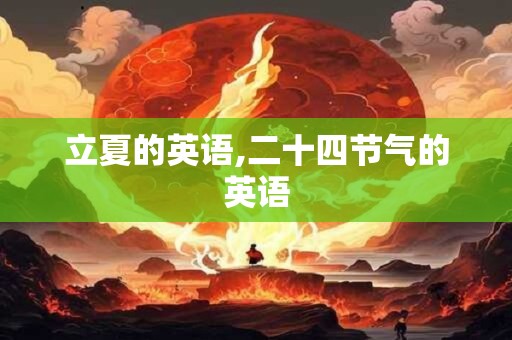Spring is in the air, and the first of the 24 solar terms, Lixia, has arrived. As the temperature rises and the days become longer, the world is filled with the vibrant energy of new life. Lixia, known as the "beginning of summer" in English, marks the transition from spring to summer and is a time of great significance in traditional Chinese culture.
Understanding Lixia
Lixia is the 7th solar term in the Chinese lunar calendar, occurring around May 5th or 6th each year. It is a time when the sun reaches its highest position in the sky, and the days are at their longest. The name "Lixia" translates to "beginning of summer" in English, symbolizing the start of the warmest season of the year.
The Significance of Lixia
In traditional Chinese culture, Lixia is a time of celebration and a reminder of the changing seasons. It is also a time to take care of one's health and to prepare for the upcoming summer heat. Here are some key aspects of the significance of Lixia:
1. Health and Wellness
According to traditional Chinese medicine, Lixia is a time when the heart is most active and prone to heat-related issues. It is essential to take care of your health during this period by:
Avoiding excessive sweating: Excessive sweating can lead to dehydration and other health issues. It is important to stay hydrated and avoid activities that cause excessive sweating.
Eating cooling foods: Foods that are cooling and nourishing, such as watermelons, cucumbers, and peaches, are recommended during Lixia.
Exercising moderately: Regular exercise can help maintain a healthy body and mind. However, it is important to avoid intense workouts during the hottest part of the day.
2. Agriculture
Lixia is an important time for agriculture, as it marks the beginning of the summer crop planting season. Farmers need to prepare their fields and plant crops such as rice, wheat, and corn to ensure a good harvest.
3. Customs and Celebrations
In some regions, Lixia is celebrated with various customs and activities. Here are a few examples:
Eating "Lixia noodles": In some areas, eating noodles on Lixia is believed to bring good luck and health.
Wearing red clothes: Red is a symbol of happiness and good fortune in Chinese culture. Wearing red clothes on Lixia is said to bring good luck.

Praying for rain: In some rural areas, people pray for rain during Lixia to ensure a good harvest.
The 24 Solar Terms
Lixia is just one of the 24 solar terms in the Chinese lunar calendar. Each solar term is characterized by specific weather patterns and agricultural activities. The 24 solar terms include:
1. Chunfen
2. Qingming
3. Xinglong
4. Qingsi
5. Guzhi
6. Lixia
7. Xiaoman
8. Changchun
9. Yushu
10. Bailu
11. Daxue
12. Xiaoxue
13. Hanlu
14. Qingming
15. Guzhi
16. Lixia
17. Xiaoman
18. Changchun
19. Yushu
20. Bailu
21. Daxue
22. Xiaoxue
23. Hanlu
24. Chunfen
Conclusion
Lixia is a time of transition, growth, and celebration. It is a reminder of the changing seasons and the importance of taking care of our health and the environment. As we welcome the arrival of summer, let us appreciate the beauty of nature and the wisdom of our ancestors.
